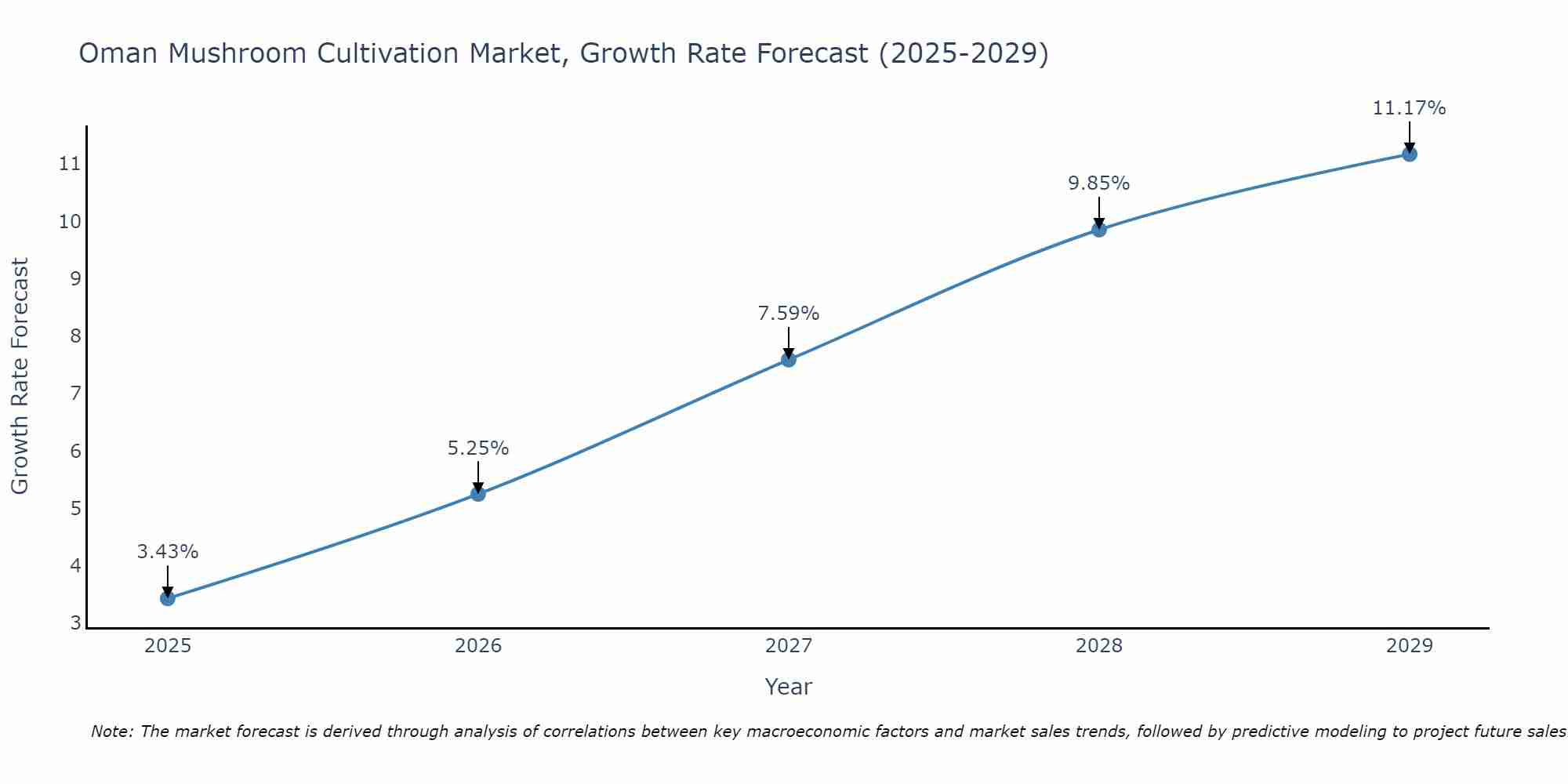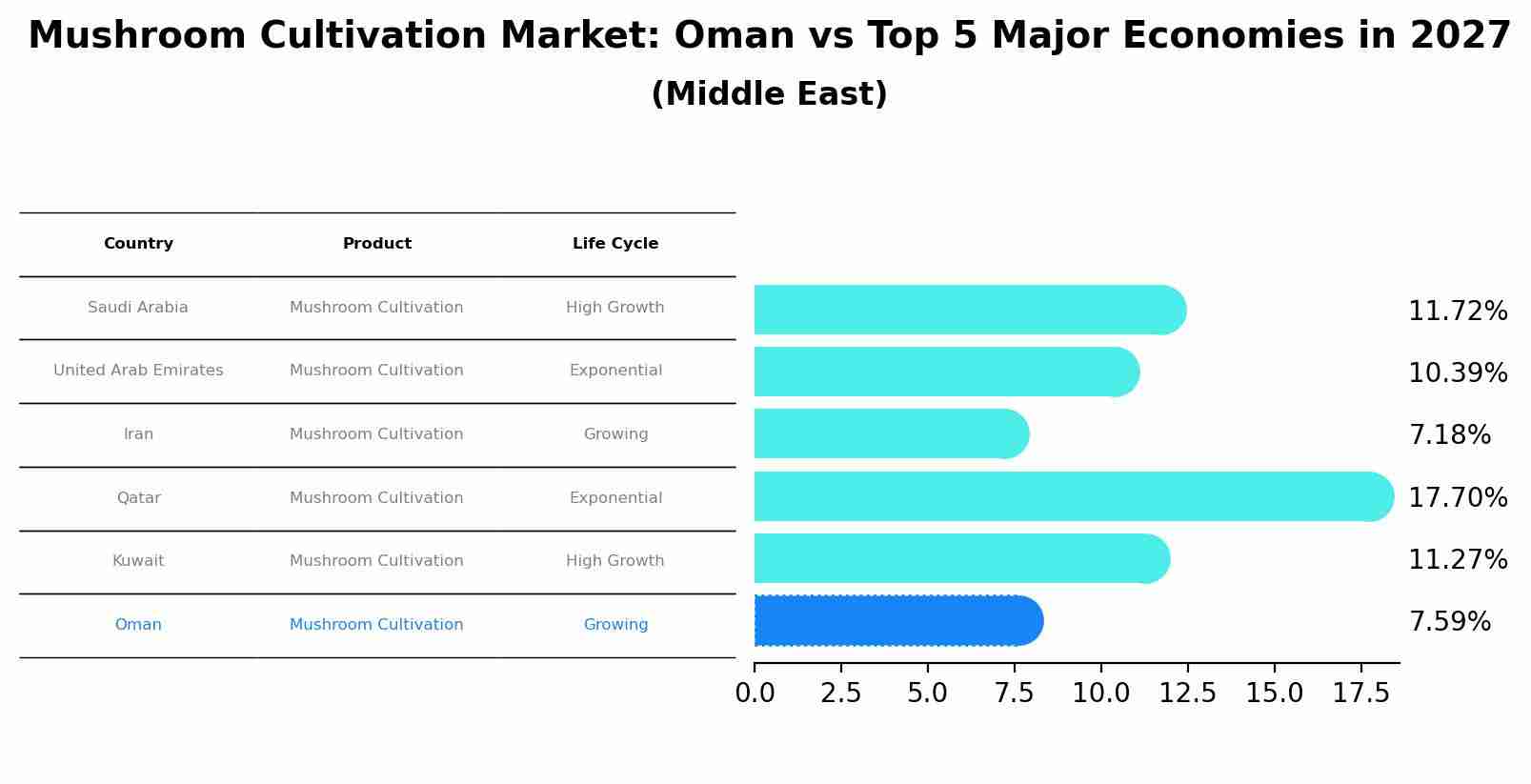Oman Mushroom Cultivation Market Outlook | Size, COVID-19 IMPACT, Share, Trends, Analysis, Forecast, Revenue, Value, Growth, Industry & Companies
| Product Code: ETC383143 | Publication Date: Aug 2022 | Updated Date: Apr 2025 | Product Type: Market Research Report | |
| Publisher: 6Wresearch | Author: Shubham Padhi | No. of Pages: 75 | No. of Figures: 35 | No. of Tables: 20 |
Oman Mushroom Cultivation Market Size Growth Rate
The Oman Mushroom Cultivation Market is likely to experience consistent growth rate gains over the period 2025 to 2029. Commencing at 3.43% in 2025, growth builds up to 11.17% by 2029.

Mushroom Cultivation Market: Oman vs Top 5 Major Economies in 2027 (Middle East)
The Mushroom Cultivation market in Oman is projected to grow at a growing growth rate of 7.59% by 2027, highlighting the country's increasing focus on advanced technologies within the Middle East region, where Saudi Arabia holds the dominant position, followed closely by United Arab Emirates, Iran, Qatar and Kuwait, shaping overall regional demand.

Oman Mushroom Cultivation Market Overview
The mushroom cultivation market in Oman is gradually expanding as consumers increasingly recognize the nutritional and culinary benefits of mushrooms. Local production is supported by innovations in farming techniques and the rising demand for organic and locally-sourced food products. The governments agricultural policies and initiatives to promote sustainable farming practices are also playing a crucial role in bolstering the mushroom cultivation sector.
Drivers of the market
The Oman mushroom cultivation market is being driven by a combination of factors including the increasing awareness about the nutritional benefits of mushrooms, rising health consciousness among the population, and the growing demand for locally sourced organic produce. Additionally, government initiatives to promote agricultural diversification and technological advancements in cultivation methods are significantly contributing to market growth.
Challenges of the market
The mushroom cultivation market in Oman faces several challenges, including the harsh climatic conditions that are not conducive to mushroom growth, requiring significant investment in controlled environment agriculture. Additionally, there is a lack of expertise and knowledge among local farmers about modern mushroom farming techniques, leading to lower yields and quality. The market also grapples with limited access to high-quality spawn and substrates, which are essential for successful cultivation. Furthermore, the high cost of setting up and maintaining mushroom farms, combined with limited government support, hinders the growth of this market.
Government Policy of the market
The Omani government supports the mushroom cultivation market by providing subsidies for local farmers, investing in research and development for improved cultivation techniques, and promoting sustainable farming practices. Additionally, there are efforts to educate farmers on the benefits of mushroom cultivation as an alternative income source.
Key Highlights of the Report:
- Oman Mushroom Cultivation Market Outlook
- Market Size of Oman Mushroom Cultivation Market, 2024
- Forecast of Oman Mushroom Cultivation Market, 2031
- Historical Data and Forecast of Oman Mushroom Cultivation Revenues & Volume for the Period 2018 - 2031
- Oman Mushroom Cultivation Market Trend Evolution
- Oman Mushroom Cultivation Market Drivers and Challenges
- Oman Mushroom Cultivation Price Trends
- Oman Mushroom Cultivation Porter's Five Forces
- Oman Mushroom Cultivation Industry Life Cycle
- Historical Data and Forecast of Oman Mushroom Cultivation Market Revenues & Volume By Type for the Period 2018 - 2031
- Historical Data and Forecast of Oman Mushroom Cultivation Market Revenues & Volume By Button Mushroom for the Period 2018 - 2031
- Historical Data and Forecast of Oman Mushroom Cultivation Market Revenues & Volume By Oyster Mushroom for the Period 2018 - 2031
- Historical Data and Forecast of Oman Mushroom Cultivation Market Revenues & Volume By Shiitake Mushroom for the Period 2018 - 2031
- Historical Data and Forecast of Oman Mushroom Cultivation Market Revenues & Volume By Others for the Period 2018 - 2031
- Oman Mushroom Cultivation Import Export Trade Statistics
- Market Opportunity Assessment By Type
- Oman Mushroom Cultivation Top Companies Market Share
- Oman Mushroom Cultivation Competitive Benchmarking By Technical and Operational Parameters
- Oman Mushroom Cultivation Company Profiles
- Oman Mushroom Cultivation Key Strategic Recommendations
Frequently Asked Questions About the Market Study (FAQs):
- Single User License$ 1,995
- Department License$ 2,400
- Site License$ 3,120
- Global License$ 3,795
Search
Thought Leadership and Analyst Meet
Our Clients
Related Reports
- Canada Oil and Gas Market (2026-2032) | Share, Segmentation, Value, Industry, Trends, Forecast, Analysis, Size & Revenue, Growth, Competitive Landscape, Outlook, Companies
- Germany Breakfast Food Market (2026-2032) | Industry, Share, Growth, Size, Companies, Value, Analysis, Revenue, Trends, Forecast & Outlook
- Australia Briquette Market (2025-2031) | Growth, Size, Revenue, Forecast, Analysis, Trends, Value, Share, Industry & Companies
- Vietnam System Integrator Market (2025-2031) | Size, Companies, Analysis, Industry, Value, Forecast, Growth, Trends, Revenue & Share
- ASEAN and Thailand Brain Health Supplements Market (2025-2031) | Strategy, Consumer Insights, Analysis, Investment Trends, Opportunities, Growth, Size, Share, Industry, Revenue, Segments, Value, Segmentation, Supply, Forecast, Restraints, Outlook, Competition, Drivers, Trends, Demand, Pricing Analysis, Competitive, Strategic Insights, Companies, Challenges
- ASEAN Bearings Market (2025-2031) | Strategy, Consumer Insights, Analysis, Investment Trends, Opportunities, Growth, Size, Share, Industry, Revenue, Segments, Value, Segmentation, Supply, Forecast, Restraints, Outlook, Competition, Drivers, Trends, Demand, Pricing Analysis, Competitive, Strategic Insights, Companies, Challenges
- Europe Flooring Market (2025-2031) | Outlook, Share, Industry, Trends, Forecast, Companies, Revenue, Size, Analysis, Growth & Value
- Saudi Arabia Manlift Market (2025-2031) | Outlook, Size, Growth, Trends, Companies, Industry, Revenue, Value, Share, Forecast & Analysis
- Uganda Excavator, Crane, and Wheel Loaders Market (2025-2031) | Strategy, Consumer Insights, Analysis, Investment Trends, Opportunities, Growth, Size, Share, Industry, Revenue, Segments, Value, Segmentation, Supply, Forecast, Restraints, Outlook, Competition, Drivers, Trends, Demand, Pricing Analysis, Competitive, Strategic Insights, Companies, Challenges
- Rwanda Excavator, Crane, and Wheel Loaders Market (2025-2031) | Strategy, Consumer Insights, Analysis, Investment Trends, Opportunities, Growth, Size, Share, Industry, Revenue, Segments, Value, Segmentation, Supply, Forecast, Restraints, Outlook, Competition, Drivers, Trends, Demand, Pricing Analysis, Competitive, Strategic Insights, Companies, Challenges
Industry Events and Analyst Meet
Whitepaper
- Middle East & Africa Commercial Security Market Click here to view more.
- Middle East & Africa Fire Safety Systems & Equipment Market Click here to view more.
- GCC Drone Market Click here to view more.
- Middle East Lighting Fixture Market Click here to view more.
- GCC Physical & Perimeter Security Market Click here to view more.
6WResearch In News
- Doha a strategic location for EV manufacturing hub: IPA Qatar
- Demand for luxury TVs surging in the GCC, says Samsung
- Empowering Growth: The Thriving Journey of Bangladesh’s Cable Industry
- Demand for luxury TVs surging in the GCC, says Samsung
- Video call with a traditional healer? Once unthinkable, it’s now common in South Africa
- Intelligent Buildings To Smooth GCC’s Path To Net Zero


















